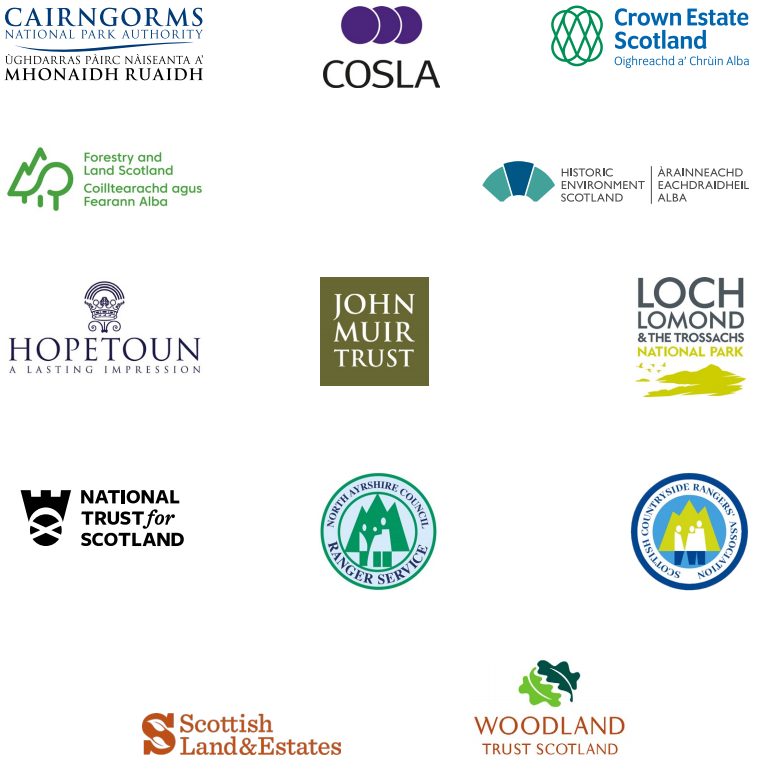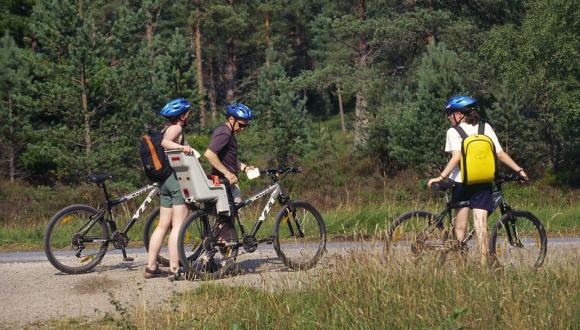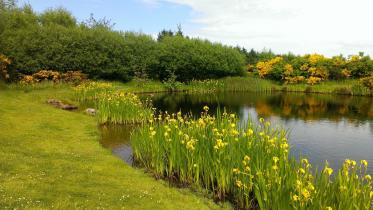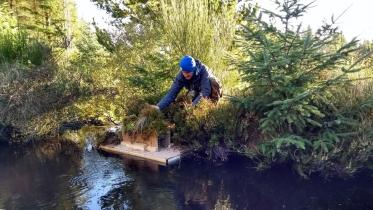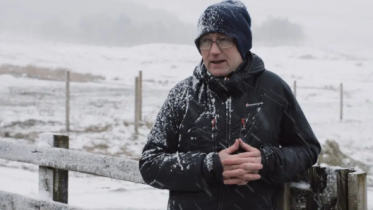Connecting people and places - a policy statement on rangering in Scotland
Pages: 12
Published: 2021
Ministerial foreword
Our natural and historic environments are a cornerstone of Scotland’s identity and a common heritage for all to enjoy. They also have key roles in recreation and tourism, providing essential health and economic benefits which can support a green recovery from COVID-19. To realise these benefits, it is crucial to safeguard these resources and help everyone to connect with them, including those who live in Scotland and those we welcome as visitors.
For many years, Scotland’s rangers have brought people closer to Scotland’s nature and heritage, working in many different settings including urban greenspace, popular visitor attractions, rural estates and island communities. Despite this diversity, all are united by their knowledge, passion and commitment to these places, and the ability to convey this to others face to face in a way that online communication, for all its strengths, cannot.
Recent decades have seen many changes, including rights of responsible access and growing emphasis on addressing inequalities, promoting outdoor learning and empowering communities. There is also an urgent need to address biodiversity loss and climate emergency. Rangers have adapted over time to meet these challenges and their roles are now more relevant than ever. At the same time, these roles are increasingly fulfilled in different ways. Dedicated ranger services remain vital in many places, including some popular visitor destinations, while elsewhere rangering is undertaken by other countryside staff as part of wider job roles. These changes will continue to require a flexible approach to meet local needs in a way that best reflects local circumstances.
I warmly welcome this statement, which underlines the shared commitment of all key interests to meet these challenges. Rangering provides a golden thread connecting people and places, and we need to nurture and promote this unique range of skills to strengthen this link for the future.
Ben Macpherson, Minister for Rural Affairs and the Natural Environment
Introduction
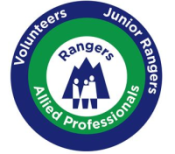
Rangers have long-established and key roles in helping people to understand, engage with and safeguard the natural and historic environment in places that people come to enjoy. Many rangers also work closely with disadvantaged groups and local communities, supporting key agendas such as tackling inequalities and community empowerment. These roles make rangering more relevant than ever, supporting important Government objectives for health and well-being, learning, tourism and inclusive economic growth. In helping to look after nature and connect more people with it, rangering also makes an important contribution to the action now required to address biodiversity loss and the climate emergency.
Rather than a single national service, rangers are employed by many organisations including local authorities, public bodies, private estates and companies, NGOs and local communities. Some rangers operate on an independent commercial basis. Ranger functions can also be undertaken by staff with other job titles or as part of different roles. This professional workforce also manages the growing number of volunteer and junior rangers, who can in turn support the work of the wider rangering family.
Scotland’s rangering family
This statement sets out a common policy framework for this diverse group of professional and volunteer staff. It uses the term “ranger” to refer to designated staff with this job title, and “rangering” to refer to the roles they fulfil, which are sometimes undertaken by allied professionals with other job titles.
A 2030 vision for rangering in Scotland
Scotland has a strong, confident and committed rangering workforce it will need to connect people with places, encourage more people from all backgrounds to enjoy Scotland’s outdoors responsibly, and take the action needed to address biodiversity loss and climate change.
The core of this workforce will be in the ranger services provided by local and national park authorities as well as private, community and third sector employers. At the same time, more rangering functions may be provided in other ways, for example through independent rangers or by allied professional staff in public bodies with other job titles. Rangering across Scotland will also be enriched by growth in volunteer rangers and a thriving junior ranger programme.
To realise this vision, an on-going effort will be required by a range of national partners and ranger managers to support and develop the workforce, to maintain a common identity easily recognised by the public who they serve, and to champion the benefits that rangering provides.
Defining the role of rangering
The overall purpose of rangering is to connect people with places. All people with rangering roles should have strong interpersonal skills, be knowledgeable about the natural and cultural heritage and be committed to increasing enjoyment, understanding and care of these resources by and for the public.
Ranger services provide a dedicated resource for this task and remain the best means of delivery for key sites, strategic routes and peri-urban or wider areas which are popular with visitors. The term “ranger” denotes a widely understood and highly skilled role that is backed up by professional standards. At times, however, different job titles may be equally appropriate depending on changing organisational needs and professional roles or to meet the requirements of funding bodies. Recognising this diversity can help to provide a stronger and broader-based profession for the future.
When well-managed and used according to the principles in the STUC/Volunteer Scotland Volunteer Charter, volunteer rangers can also make an important contribution. Junior and apprentice ranger schemes add to awareness and interest in, and future development of, the profession.
Key benefits provided by rangering
For people
- Supporting recreation and enjoyment, helping to improve people’s physical and mental health and well-being
- Providing a visible, welcoming and reassuring presence for less confident users, including visitors, under-represented groups and others who benefit from particular support
- Working with volunteers, including communities, to enhance the natural and cultural heritage
- Supporting outdoor learning and helping people to enjoy, share, understand and connect with the natural and cultural heritage
For places
- Reducing adverse impacts on the natural and historic environment, for example by promoting responsible access and active travel
- Assisting with the implementation of COVID-19 measures and other public health requirements
- Improving the condition of natural and historic features through site and countryside management
- Interpreting and supporting positive action by the public to address the climate emergency and biodiversity loss
For land managers
- Promoting responsible access and helping land managers to manage land responsibly for access
- Helping visitors to understand land management needs and vice versa
For employers
- Ensuring better management and use of key sites and facilities
- Liaising with local residents, communities and land managers, hearing views and identifying issues
- Undertaking monitoring, surveys, planning and management
- Supporting the sustainable development of communities through community-based ranger services
National Outcomes supported include:
- Children and young people
- Economy
- Communities
- Education
- Health
- Culture
- Environment
The changing context
Rangering has a strong statutory foundation under the Countryside (Scotland) Act 1967 (as amended) and subsequent legislation, which provides powers for local authorities and other public bodies to employ rangers. The context in which rangers operate has however evolved considerably since the first services were established. The roles of rangers have developed over time to reflect these changes, which require an increasingly broad range of skills and working links with other outdoor professionals and community engagement specialists.
The Land Reform (Scotland) Act 2003 introduced rights of responsible access to most land, with a framework for local access management led by local authorities and supported by local access forums and dedicated access staff. While traditional countryside destinations are still popular, there is now much greater interest in the provision and promotion of green networks for outdoor recreation and active travel in urban and peri-urban areas. The availability of online information and changing social attitudes may also be altering the types of support that are needed in outdoor settings. The role of rangers in environmental education now includes supporting teachers to take learning outdoors, in line with the Curriculum for Excellence and the professional standards expected of teachers in Scotland. The community empowerment agenda and growing recognition of the climate emergency are increasingly reflected in the work of rangers and allied staff.
Support for ranger services has been affected by pressures on public finances, with reduced public funding and growing reliance on more complex and diverse partnership arrangements, sometimes involving trusts and the private sector. This, in turn, has further diversified the roles of rangers, with increasing involvement in activities that generate direct economic returns from the public or provide services for sectors such as health and education which have funding available.
These changes in the work of, and support for, ranger services have resulted in the greater amalgamation of ranger roles with other greenspace and countryside staff. Particularly within local authorities, there has also been a progressive reduction in the number of designated “rangers” due to the hard choices these authorities have to make across all areas of spend in light of increasing pressures on their budgets and services. While ranger services continue to exist in many local authorities, rangering roles are sometimes now fulfilled by staff with wider remits including, for example, biodiversity, countryside services, parks/greenspace and outdoor access. This trend presents some challenges, and while acknowledging these local operational drivers, an on-going effort will be required to ensure that the value of rangering functions is recognised and to consider ways to prevent them from being eroded and lost within wider job roles. At the same time, some broadening of remits could facilitate better joint working within local authorities and other employing bodies, and allow ranger functions to continue when they might otherwise be lost.
Despite this changing context and the challenges it brings for many organisations who work in this sector, it is clear that rangering has never been more relevant. Increasing people’s connection with nature is firmly recognised as making an important contribution to the national performance framework, contributing to Scottish Government priorities on inclusive economic growth, closing the attainment gap in education, improving public health, tackling inequalities, and responding to biodiversity loss and the climate emergency. Rangers continue to have unique and important roles which complement those of other professionals such as access officers, biodiversity officers, teachers and tourism providers, drawing on their professional knowledge, experience and passion for the environment.
Weekly visits to the outdoors have continued to increase over the last 10 years with over 400,000 more people getting active outdoors each week. There may also be a growing future emphasis on domestic tourism within the UK in response, for example, to the climate emergency and the long-term impact of COVID-19. These trends may bring both issues and opportunities for the places people are going to enjoy. The pressures on popular “hot-spots” are clearly evident and in some cases growing, and site-based ranger services can play particularly valuable roles, for example by helping to promote responsible behaviour. Maximising these benefits and addressing these impacts will require fresh approaches and targeted investment in both people and places.
Achieving the vision
The 2030 vision has a number of implications for future action to support rangering in Scotland. There is a continuing need to emphasise the vital importance of ranger functions and their contribution to key Government agendas. Rangers will remain a cornerstone of this vision and sustained effort in developing the profession further will be essential. The growing diversity of the rangering workforce also needs to be recognised and embraced.
Ensuring more stable long term funding for ranger services and related posts will be important to realise this vision, and is likely to present ongoing challenges. Continued creativity will be needed to allow employing bodies and ranger managers to identify new sources of support, and the ability to respond to emerging agendas will help to open up new opportunities. The strong case for on-going investment in rangering also needs to be made more regularly at all levels.
A Scotland-wide collaborative network already exists to facilitate collective action, with the Ranger Development Partnership (see below for Ranger Development Partnership organisations) providing a strategic overview at senior level, supported by the Ranger Managers' Forum and Ranger Rendezvous events. It will be important for employers and other interested parties, and rangers and allied staff, to continue to liaise through this network to share experience, promote and develop the necessary skills, and identify new funding sources. The Scottish Countryside Rangers' Association (SCRA) will continue to play an important role in maintaining high professional standards and support for the national and international network of ranger services.
Summary of action required
| Proposed action | Lead partners |
|---|---|
|
Develop improved and more regular reporting framework(s) to highlight the achievements of rangers and make the case for continued investment in the ranger workforce. |
NatureScot, Scottish Government
|
|
Promote the importance of the full range of rangering skills and professional competencies, including the Scottish Countryside Rangers’ Association ranger award. |
Scottish Countryside Rangers’ Association
|
|
Explore ways in which ranger and allied professional bodies could collaborate to achieve a stronger combined representative role. |
Scottish Countryside Rangers’ Association
|
|
Establish common approaches to maintaining public recognition of the ranger ‘brand’, for example by developing the ranger badge as an accreditation mark to encourage uptake by different employers. |
Ranger Development Partnership
|
| Proposed action | Lead partners |
|---|---|
|
Learn from European experience of different models to deliver and support ranger services. |
NatureScot, Scottish Countryside Rangers’ Association
|
|
Maintain oversight of public sector funding for rangering and keep future funding opportunities under review. |
NatureScot, Scottish Government
|
|
Provide on-going support to identify and promote new sources of project funding for rangering activity. |
Ranger Development Partnership |
| Proposed action | Lead partners |
|---|---|
|
Develop stronger, shared approaches to training and skills development for rangers, allied professionals and volunteers, including the Scottish Countryside Rangers’ Association ranger award. |
Historic Environment Scotland, Forestry and Land Scotland, NatureScot, Scottish Countryside Rangers’ Association, Scottish Land and Estates, Loch Lomond and the Trossachs National Park Authority |
|
Develop the next generation of rangers through apprenticeships and junior ranger schemes, and by promoting rangering as a career path for young people. |
NatureScot, Scottish Countryside Rangers’ Association |
Building the contribution of rangering together
Over recent decades, the knowledge and skills that rangers provide have helped to build a stronger outdoor culture in Scotland. Rangering remains vital to promote wider participation in outdoor recreation and physical activity, and to realise the potential benefits for health and well-being, in particular among disadvantaged communities and hard to reach groups. Rangering skills will also be increasingly important to positively address the challenges that arise from more people enjoying the outdoors and to help address visitor pressures, biodiversity loss and climate change. This key range of professional skills cannot however be taken for granted and continued commitment will be needed to sustain, develop and, where necessary, adapt them for the future. This will require collaborative effort by all the partners to this statement, ranger service managers and rangers themselves.
This statement has been endorsed by the Ranger Development Partnership, comprising:
- Cairngorms National Park Authority
- Convention of Scottish Local Authorities
- Crown Estate Scotland
- Forestry and Land Scotland
- Historic Environment Scotland
- Hopetoun House Preservation Trust
- John Muir Trust
- Loch Lomond & The Trossachs National Park Authority
- National Trust for Scotland
- NatureScot
- North Ayrshire Council
- Scottish Countryside Rangers’ Association
- Scottish Land and Estates
- Woodland Trust Scotland
